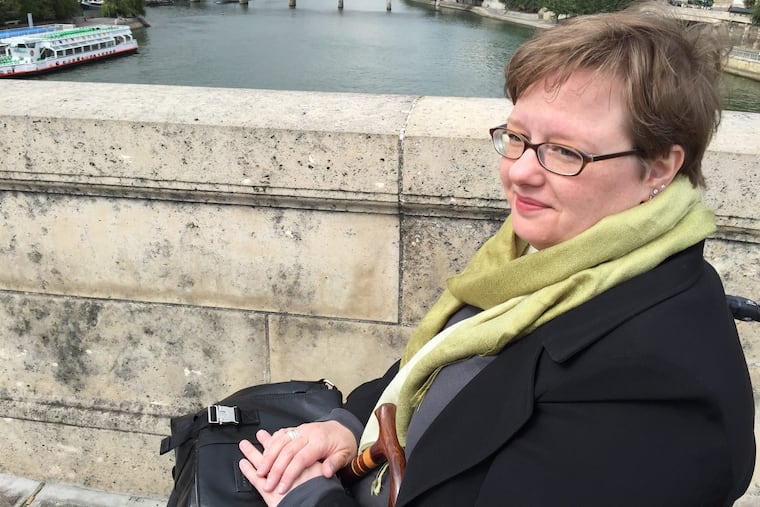Shining a light on chronic fatigue syndrome, a little understood disease among doctors
I am fortunate, because I have a knowledgeable doctor and the right diagnosis. It is estimated that up to 90 percent of the 1 million to 2.5 million Americans with Chronic Fatigue Syndrome still have not been properly diagnosed.

I recently went to a new doctor. He looked over my chart: "Chronic fatigue syndrome," he read, and then he glanced up at me. "You don't look tired," he quipped. "There, I made it go away."
I've been sick for 24 years, and I get comments like this a lot.
I've grown accustomed to comments like this because my disease — myalgic encephalomyelitis/chronic fatigue syndrome (ME/CFS) — is a debilitating neuroimmune disease that is poorly understood by most of the medical community.
I was 26-years-old when I first got sick with what seemed to be a flu-like virus. Six months later, I was diagnosed with CFS, as it was known in the 1990s. Every day, I deal with widespread pain, brain fog, low blood pressure, and a slew of other symptoms. Worst of all, even mild physical or cognitive exertion makes me feel sicker. This disease robbed me of my career as an attorney, my plans for a family, and even simple activities such as driving or taking a walk. I never imagined I would still be sick a quarter-century after getting ill.
Yet I am fortunate, because I have a knowledgeable doctor and the right diagnosis. It is estimated that up to 90 percent of the 1 million to 2.5 million Americans with ME/CFS still have not been properly diagnosed. Despite recent reports from the National Academy of Medicine and several federal agencies, most doctors simply don't have the right information about diagnosing ME/CFS or helping patients cope with it.
ME/CFS presents a range of symptoms and severity. Many of us are housebound or bedridden, and there are no FDA-approved treatments. We cobble together regimens of medications, supplements, and coping strategies through self-experimentation. Those who have the financial resources, and are not too sick to travel, clog the waiting lists of the few expert doctors in the country who treat this disease. And we fight a constant battle to be believed by our families, friends, and colleagues, who dismiss the illness as all in our heads.
When we go to doctors, we frequently endure the same dismissal or disbelief — like the doctor who claimed he "made it go away" for me. Educating healthcare providers about ME/CFS is critical, yet it is rarely taught in medical schools. Most healthcare providers not only do not know how to help us, they may inadvertently harm us by basing their advice on outdated misinformation.
Case in point: One of the most common suggestions we hear from doctors is to exercise. Yet every person with ME/CFS who pushes their body too hard will experience worsening symptoms. Most doctors are unaware or dismissive of the research that shows our bodies do not recover from physical or cognitive effort in normal ways. Claiming that exercise will improve ME/CFS is like telling a diabetic that sugar will cure them.
I am part of a movement to change all this. I share my experiences because so many people do not know about ME/CFS, and I participate in educational events. The Philadelphia County Medical Society is hosting such an event on November 14. The program will feature a screening of the award-winning documentary Unrest followed by an expert panel discussion.
Filmmaker Jen Brea was a doctoral candidate at Harvard University when she got a mysterious fever that left her bedridden. Doctors erroneously dismissed her neurological symptoms as a mental condition called conversion disorder. She turned the camera on herself, and her film Unrest won a Sundance award, was shortlisted for an Oscar, and aired on PBS Independent Lens.
The event at the Philadelphia County Medical Society comes on the heels of similar recent events held at the CDC, the New York State Department of Health, and Harvard Medical School. These events bring the personal stories of people with ME/CFS directly to medical professionals.
Philadelphia has an incredible legacy in medical history and some of the best healthcare in the world, but there are thousands of people in our area who are impacted by ME/CFS. We need knowledgeable medical care that helps us maximize our health and quality of life. In order to do that, our doctors need the right information about how they can help their patients. This event at the Philadelphia County Medical Society can help equip doctors to provide us with the best possible care.
I still have hope that a doctor will tell me that she can make ME/CFS go away — in real life. But until that day, I will do everything I can to help doctors help ME/CFS patients like myself.
Jennie Spotila is a writer and advocate who lives in King of Prussia, Pa. She writes about ME at occupyme.net.
Event details: Philadelphia County Medical Society presents a screening of Unrest and expert panel discussion, Wednesday, November 14, from 6:30 to 8:30 p.m. at 2100 Spring Garden St. This event is open to the public, and CAT 2 CME credits are available for healthcare professionals. RSVP by phone at 215-563-5343 or online at https://philamedsoc.org/pcms-events/myalgic-encephalomyelitis-chronic-fatigue-program/